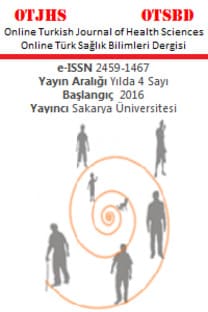Farklı Yaşam Koşullarında Yaşayan Yaşlıların Mutluluk Düzeyi ve Yaşam Kalitesi: Karşılaştırmalı Bir Çalışma
Yaşlılık, Mutluluk, Huzurevi, aile ortamı, sağlıkla ilişkili yaşam kalitesi
Happiness Level and Life Qualıty of the Elderly Living in Different Life Conditions: A Comparative Study
Elderly, family environment, happiness, health-related quality of life, nursing home,
___
- 1. World Health Organization. Ageing and health https://www.who.int/news-room/fact-sheets/detail/ageing-and-health, 2018 (Accessed Date:01.05.2020)
- 2. Turkish Statistical Institute https://hsgm.saglik.gov.tr/depo/birimler/kronik-hastaliklarengellidb/hastaliklar/Yasli_Sagligi/raporlar_istatistikler/TUIK_Yasli_Istatistik_2018.pdf (Accessed Date:01.05.2020)
- 3. Artan T, Irmak HS. (). Evaluation of the perspective of aging in nursing home of elderly living in nursing homes: sample of Istanbul Bahçelievler, Zeytinburnu and Sultangazi nursing home. Society and Social Work 2018;29(2):51-70.
- 4. Ngamaba KH, Soni D. Are happiness and life satisfaction different across religious groups? exploring determinants of happiness and life satisfaction. J Relig Health. 2018;57:2118–39.
- 5. Akın HB, Şentürk E. (). Analysing levels of happiness of individuals with ordinal logistic analysis. Oneri Journal. 2012;10(37): 183-93.
- 6. Bowling, A. (2008). Enhancing later life: how older people perceive ageing? Aging Ment Health. 12(3), 293– 301.
- 7. Ercan Şahin N, Emiroğlu O. Quality of life and related factors of older people in nursing home. Journal of Hacettepe University Faculty of Nursing. 2014;1(1):57–66
- 8. Akyıl Çevik R, Adıbelli D, Erdem N, Kırağ N, Aktaş B, Karadakovan A. The relationship between loneliness and perceived social support and happiness levels in the nursing home and the elderly who stay at home. Anadolu Nursing and Health Sciences Journal. 2018;21(1): 33-41
- 9. Diener E, Scollon CN, Lucas R E. The evolving concept of subjective well-being: The multifaceted nature of happiness. Advances in Cell Aging and Gerontology. 2009;15:187–19. DOI: 10.1016/S1566-3124(03)15003-1
- 10. Hills P. Argyle M. The Oxford happiness questionnaire: A compact scale for the measurement of psychological well-being. Personality and Individual Differences. 2002; 33(7). 1073-82. http://dx.doi.org/10.1016/S0191-8869(01)00213-6
- 11. Doğan T, Çötok NA. Adaptation of the short form of the oxford happiness questionnaire into turkish: a validity and reliability study. Turkish Psychological Counseling and Guidance Journal. 2011;4(36):165 – 70.
- 12. Power M, Quinn K, Schmidt S ,WHOQOL-OLD Group. Development of the WHOQOL-OLD module. Qual Life Res. 2005;14 (10):2197-214.
- 13. Eser S, Saatli G, Eser E, Baydur H, Fidaner, C. The reliability and validity of the Turkish Version of the World Health Organization Quality of Life Instrument-Older Adults Module (WHOQOL-Old)]. Turk Psikiyatri Derg. 2010; 21(1):37-48.
- 14. Burcu E, Akalın E. Sociological discussions on the case of death. HÜTAD, 2008; 8: 29-54.
- 15. Akın A, Satıcı SA. Subjectıve happıness scale: a study of valıdıty and relıabılıty. Sakarya University Journal of Education Faculty. 2011;21(21):65-78
- 16. Neocleous G, Apostolou. Happiness in and out of nursing homes: The case of Cyprus. International Social Work. 2016;59(4):533–44.
- 17. Azami E, Sadeghi Z, Ravandi S. A comparative investigation of mental health and happiness among elderly living at home and nursing home residents Journal of Geriatric Nursing. 2016;3(1):76-88.
- 18. Özer M, Karabulut ÖÖ. Satisfaction of life in elderly individuals. Turk J Geriatrics. 2003;6:72-4.
- 19. Dale MC, Burns A, Panter L, Morris J. Factors affectıng survıval of elderly nursıng home resıdents. Int J Geriatr Psychiatry. 2001;16(1):70-6.
- 20. Moeini B, Barati M, Farhadian M, Ara MH. The association between social support and happiness among elderly in Iran. Korean J Fam Med.2018; 39(4): 260–65.
- 21. Erkal S, Şahin H, Sürgit E B. Examınatıon of the relatıonshıp between the qualıty of lıfe and demographıc and accıdent-related characterıstıcs of elderly people lıvıng ın a nursıng home. Turkish Journal of Geriatrics. 2011;14 (1) :5-53. 22. De Souto, Barreto P, Lapeyre-Mestre M, Vellas B, Rolland Y. Multimorbidity type, hospitalizations and emergency department visits among nursing home residents: a preliminary study. J Nutr Health Aging. 2014; 18(7):705-9. doi: 10.1007/s12603-014-0030-6. 23. Yağcıoğlu R. Examination of the factors affecting the quality of life of elderly people over 65 in nursing homes. [master's thesis]. Konya. Turkey: Department of Social Work. Institute Of Health Sciences 2013. Konya 24. Vossius C, Selbæk G, Šaltytė Benth J, Bergh S. Mortality in nursing home residents: a longitudinal study over three years. PLoS One 2018; 13(9): e0203480. 25. Karakaya MG, Bilgin SC, Ekici G, Köse N, Otman AS. Functional mobility. depressive symptoms. level of ındependence. and quality of life of the elderly living at home and in the nursing home. J Am Med Dir Assoc. 2009;10(9):662-6. doi: 10.1016/j.jamda.2009.06.002. 26. Brown MA, Collett GK, Josland EA, Foote C, Li Q, Brennan FP. CKD in elderly patients managed without dialysis: survival. symptoms. and quality of life. Clin J Am Soc Nephrol 2015; 10, 260–268. 27. Carreiro-Martins P, Gomes-Belo J, Papoila AL, et al. Chronic respiratory diseases and quality of life in elderly nursing home residents. Chron Respir Dis. 2016; 13(3):211-9. doi: 10.1177/1479972316636990. Epub 2016 Mar 10. 28. Onunkwor OF, Al-Dubai SAR, George PP, et al. A cross-sectional study on quality of life among the elderly in non-governmental organizations’ elderly homes in Kuala Lumpur. Health Qual Life Outcomes. 2016;14(6):1-10. doi: 10.1186/s12955-016-0408-8. 29. Altay B, Çavuşoğlu F, Çal A. The factors affecting the perception of elderly patients towards health. quality of life and health-related quality of life. TAF Prev Med Bull. 2016;15(3):181-89.
- ISSN: 2459-1467
- Yayın Aralığı: Yılda 4 Sayı
- Başlangıç: 2016
- Yayıncı: Oğuz KARABAY
COVID-19 Pandemi Süresince İnsanlarda Değişen Beslenme Alışkanlıkları İle Obezite İlişkisi
Sultan ÇULFA, Elif YILDIRIM, BANU BAYRAM
Gul DERTLI, Mehmet Ali KURCER, Zeynep ERDOĞAN İYİGÜN
Fatih VAROL, Oznur ESER, Günay KAPLAN, Aysun BOGA, Şirin GÜVEN, Betul Zehra PIRDAL
Celalettin KORKMAZ, Soner DEMİRBAŞ, Hülya VATANSEV
Hasta Yakınlarının Aile Yaşam Doyumu ve Umutsuzluk Düzeyleri
Demet İNANGİL, Pınar Irmak VURAL, Gülşah KÖRPE
Yetişkinlerde Gıda Etiketi Okuma Bilgi Düzeyi ile Davranışa Geçirme Arasındaki İlişki
Mervenur GÖKÇEN, Aylin SEYLAM KÜŞÜMLER
Şizofrenide Psikojenik Polidipsiye Bağlı Gelişen Atrial Fibrilasyon: Bir Olgu Sunumu
Yaşar KAPICI, Sabri ABUŞ, Atilla TEKİN
Ebelik Öğrencilerinin Güdülenme Düzeylerinin Mesleki Kariyer Planlarına Etkisi
Rapunzel Sendromuna Bağlı İntestinal Obstrüksiyonun Farklı Bir Klinik Sunumu: İshal
